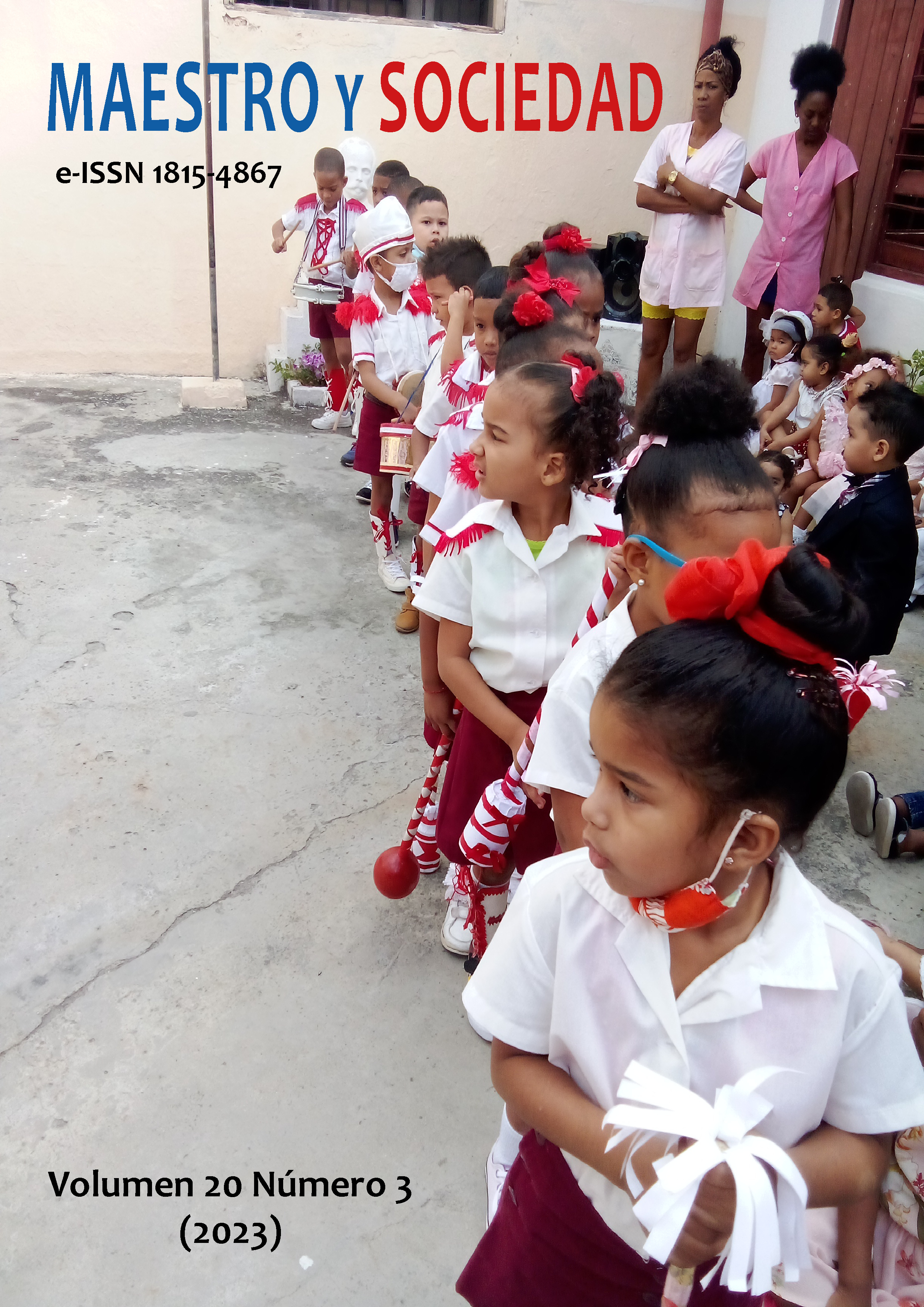La gestión en seguridad ciudadana: una mirada desde la corresponsabilidad sociocomunitaria
Citizen security management: A look from socio-community co-responsibility
Palabras clave:
gestión, seguridad ciudadana, actores locales, corresponsabilidad, comunidad, management, citizen security, local actors, joint responsibility, communityResumen
Introducción: El principal anhelo de los habitantes del planeta tierra es la seguridad, aspiración contenida en la agenda 2030, cuya expresión debe ser el resultado de la integración de las influencias de los actores locales con un enfoque socioeducativo, interdisciplinar e intersectorial. De ahí el objetivo de contribuir a la preparación de los actores locales para la gestión en seguridad ciudadana desde su práctica socioeducativa en el contexto comunitario. Materiales y métodos: Los métodos de investigación utilizados fueron diversos tanto del nivel teórico, como empírico y matemático-estadístico, sustentados en el dialéctico materialista. Resultados: El establecimiento de pautas orientacionales para la gestión en seguridad ciudadana de los actores locales en el contexto comunitario con un enfoque socioeducativo, interdisciplinar e intersectorial a partir de su reconocimiento como contenido inherente a la función social asumida en el que emerge la escuela eje articulador en este contexto. Discusión: Las comunidades, generadoras por excelencia de intensa sociabilidad, se constituyen en un escenario estratégico para una eficiente gestión de la seguridad ciudadana, en ellas interactúan actores locales con funciones diversas, caracterizadas por ser desiguales en la densidad habitacional, el comportamiento de los factores de riesgo todo lo cual justifica la necesidad de lograr la regulación, protección y potenciación de hábitos, actitudes personales y comunitarias, así como de valores socialmente aceptables. Conclusiones: La preparación de los actores locales en seguridad ciudadana, evidencia las potencialidades existentes para su gestión desde la integración de sus influencias educativas.
Introduction: The main desire of the inhabitants of planet earth is security, an aspiration contained in the 2030 agenda, whose expression must be the result of the integration of the influences of local actors with a socio-educational, interdisciplinary and intersectoral approach. Hence the objective of contributing to the preparation of local actors for citizen security management from their socio-educational practice in the community context. Materials and methods: The research methods used were diverse both at the theoretical level, as well as empirical and mathematical-statistical, based on the materialist dialectic. Results: The establishment of guidelines for citizen security management of local actors in the community context with a socio-educational, interdisciplinary and intersectoral approach based on its recognition as content inherent to the assumed social function in which the articulating axis school emerges in this context. Discussion: The communities, generators par excellence of intense sociability, constitute a strategic scenario for an efficient management of citizen security, in which local actors with diverse functions interact, characterized by being unequal in housing density, the behavior of risk factors, all of which justifies the need to achieve regulation, protection and empowerment of habits, personal and community attitudes, as well as socially acceptable values. Conclusions: The preparation of local actors in citizen security shows the existing potential for their management from the integration of their educational influences.
Citas
Canales Gonzáles, O. (2021). La Seguridad Pública: Problemática, Retos y Desafíos. Estudios de la Seguridad Ciudadana, 4(4).
Diaz-Canel, M. (2021). Sistema de gestión del gobierno basado en Ciencia e Innovación para el Desarrollo Sostenible. [Tesis de doctorado, Universidad Martha Abreu, Cuba].
Estrada Rodríguez, J. L. (2020). Seguridad Ciudadana: Visiones compartidas. Comunicación social. http://www.comunicacionsocial.es
Gómez-Rojas, C. P. y Cortés-Vargas, Y. L. (2021). Cómo pensar la gestión del servicio público de seguridad ciudadana en la Región Metropolitana de Bogotá, Estudios Urbanos. http://es.scribd.com
Orellana, C. I. (2022). El concepto de inseguridad ciudadana como hecho social subjetivo. Estudios Centroamenricanos. http://www.researchgate.net
PNUD (Programa de las Naciones Unidas para el Desarrollo). (2020). COVID-19 and Human Development: Assessing the Crisis, Envisioning the Recovery. Human Development Perspectives.
Rodríguez-González, A., Portundo-Maurelo, Y., & Mafrán-Domínguez, Y. (2022). El psicopedagogo como gestor del desarrollo humano local: agente importante en la transformación social. https://edusol.cug.co.cu:443/index.php/EduSol/article/view/180
Rojas Valdés, A., et al. (2020) La formación de actores en función de la responsabilidad social universitaria. http://coodes.upr.edu.cu/index.php/coodes/article/view/350
Descargas
Publicado
Cómo citar
Número
Sección
Licencia
Derechos de autor 2023 Pedro Abel Arjona Sánchez, Yamilia Portuondo Maurelo, Arianne Rodríguez González, Rosana Isabel Pérez Portuondo

Esta obra está bajo una licencia internacional Creative Commons Atribución-NoComercial-SinDerivadas 4.0.
Esta revista proporciona un acceso abierto inmediato a su contenido, basado en el principio de que ofrecer al público un acceso libre a las investigaciones ayuda a un mayor intercambio global de conocimiento. Cada autor es responsable del contenido de cada uno de sus artículos. Los artículos pueden ser inéditos o estar disponibles previamente en servidores de preprints reconocidos por la revista. Sin embargo, no se permite la duplicación de la publicación o traducción de un artículo ya publicado en otra revista o como capítulo de un libro.
This journal provides immediate open access to its content, based on the principle that providing the public with free access to research supports a greater global exchange of knowledge. Each author is responsible for the content of each of their articles. Articles may be previously unpublished or available on preprint servers recognized by the journal. However, duplication of publication or translation of an article already published in another journal or as a book chapter is not permitted.
Esta revista oferece acesso aberto imediato ao seu conteúdo, com base no princípio de que oferecer ao público acesso gratuito à pesquisa contribui para um maior intercâmbio global de conhecimento. Cada autor é responsável pelo conteúdo de cada um de seus artigos. Os artigos poderão ser inéditos ou estar previamente disponíveis em servidores de preprints reconhecidos pela revista. No entanto, não é permitida a duplicação de publicação ou tradução de artigo já publicado em outro periódico ou como capítulo de livro.



























 Universidad de Oriente
Universidad de Oriente 